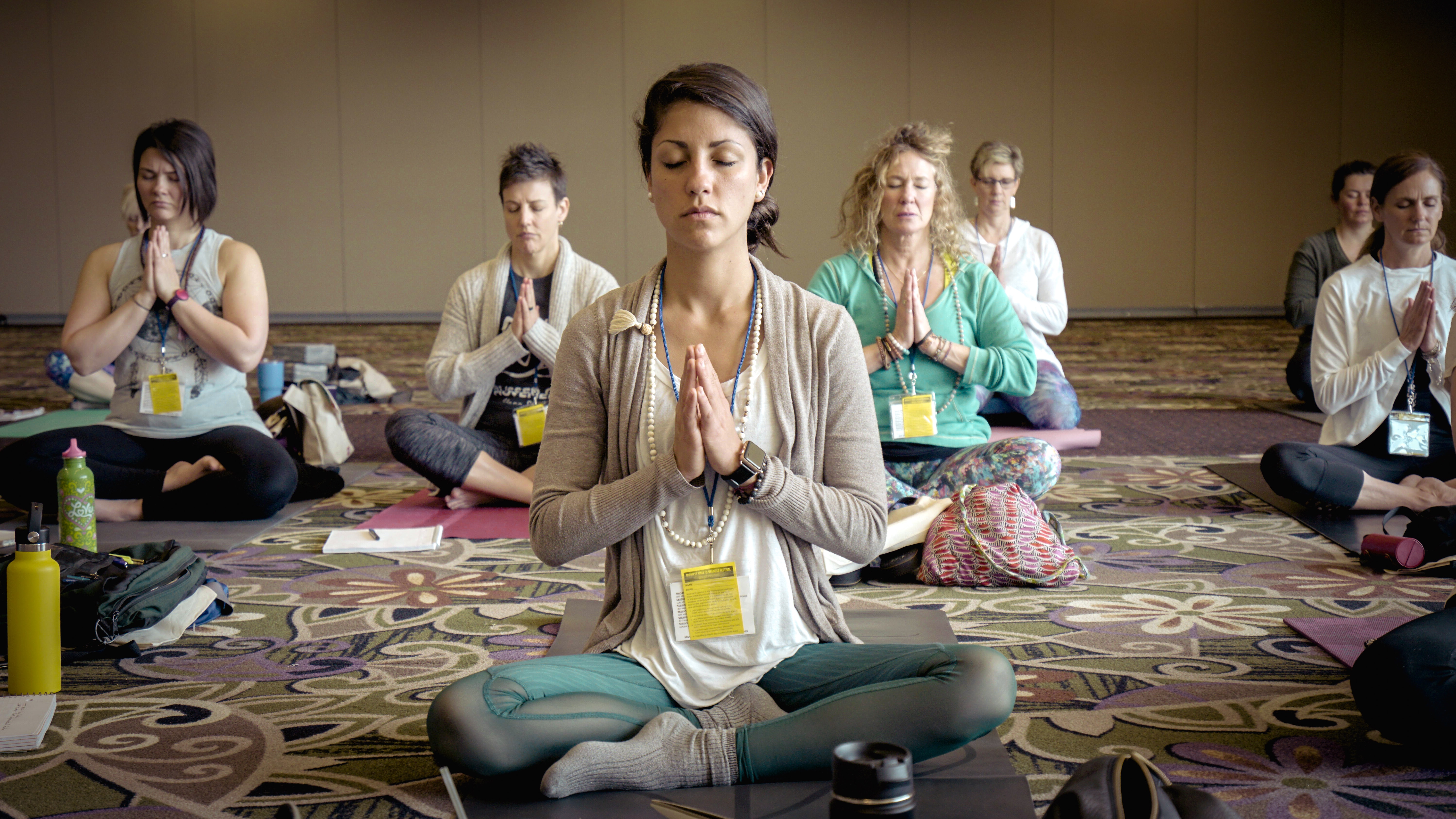Compassion for Health and Wellbeing
May 04, 2023
Listening to our hearts
“The intimacy that arises in listening and speaking truth is only possible if we can open to the vulnerability of our own hearts. Breathing in, contacting the life that is right here, is our first step. Once we have held ourselves with kindness, we can touch others in a vital and healing way.”
― Tara Brach, True Refuge: Finding Peace and Freedom in Your Own Awakened Heart
 Compassion is an intrinsic part of Buddhist and yogic cultures, where there is an emphasis on feeling a deeper connection through non-violence and kind attention to the present moment. Metta Bhavana is one of the core Buddhist meditations and translates (from Pali), with Metta meaning loving-kindness and Bhavana to cultivation or development. With our tendencies for self-criticism and judging inner voices, this practice is gathering interest and respect from Western ideologies and researchers. For those practising it is not news that the practice sows the seeds to take a more kind, loving and gentle attitude out into the world and so creates positive ripples that feed back into ourselves as part of the wider community. This connection to others fosters an easier relationship with social engagement, which integrates higher and lower brain functions to feel reason and instinct fall into smooth patterns of communication.
Compassion is an intrinsic part of Buddhist and yogic cultures, where there is an emphasis on feeling a deeper connection through non-violence and kind attention to the present moment. Metta Bhavana is one of the core Buddhist meditations and translates (from Pali), with Metta meaning loving-kindness and Bhavana to cultivation or development. With our tendencies for self-criticism and judging inner voices, this practice is gathering interest and respect from Western ideologies and researchers. For those practising it is not news that the practice sows the seeds to take a more kind, loving and gentle attitude out into the world and so creates positive ripples that feed back into ourselves as part of the wider community. This connection to others fosters an easier relationship with social engagement, which integrates higher and lower brain functions to feel reason and instinct fall into smooth patterns of communication.
Kindness for resilience
Research findings that self-compassion increases resilience (the ability to adapt to stressful situations appropriately) as shown with a group of female students, do help to convince the ‘mainstream’ audience and medical professions that there are alternatives to medication that are easily practiced, accessible and free.
Resilience is defined as the ability to cope and adapt in the face of adversity and to bounce back even when stressors seem overwhelming. Compassion fatigue – where the energy to care becomes depleted - is common within those who help others and resilience research has gathered much momentum in the past three decades. It is a natural human stress response to ‘foster’ and look after the group as the best route to survival through ‘safety in numbers’ and the natural urge to protect future generations. This can be seen most acutely in women as the biological ‘gatherers’ of the tribe and interestingly, research has shown that women gain more anti-ageing potential in their DNA than men through loving kindness meditation practices.

New science for old wisdom
The recent science pyschoneuroimmunology is showing how emotions, attitudes and other conscious states set off instantaneous cascades from the brain to the body that affect the immune system. In this way, we are beginning to understand the very real links between stress and conditions like asthma, psoriasis, eczema, cancer, auto-immunity and chronic degenerative diseases caused by inflammation like osteoporosis and heart disease.
For instance, our first line immune defence against invading organisms is the antibody secretory IgA (sIgA), which lives in the mucous linings of the lungs, digestive tract and urinary tract. Research has shown that one angry stressful episode of five minutes can cause a sIgA drop lasting up to five hours. As sIgA is the only true anti-inflammatory system our body has, low levels can allow inflammation to happen unopposed and lead to the chronic immune conditions above. Inflammation processes use up enormous amounts of energy and can contribute to much of the fatigue felt by stress. The good news is that we have a simple and free way to prevent this chains of events occurring and make ourselves more likely to choose the dietary and lifestyle habits that support immunity and energy.
Self compassion and meditation research
The self-compassion fostered in Metta Bhavana is part of the ongoing Shamantha Project. Participants were studied before and after a three-month retreat at the Santa Barbara Institute for Consciousness Studies, where they were trained in attentional skills such as mindfulness of breathing, observing mental events and observing the nature of consciousness. They also practiced cultivating benevolent mental states, including loving kindness, compassion, empathic joy and equanimity. Levels of the stress hormone cortisol were shown to come down and also their ability to stay mindful, attentive and present in daily life had improved.
 Interestingly, whilst just three weeks of self-compassion was shown to increase stress coping in the nurses studied above and meditation shown to have an instant effect on stress, the effects have been shown to last long beyond the time practiced. New brain studies show long-term effects for memory, learning, cardiovascular health, emotional regulation, response control, attention, body awareness (eg in eating disorders) and sensory processing (making sense of the world around us). A study comparing a control group and 44 service professionals who went on a brief Mindfulness with Metta retreat with actually showed no difference of the resilience, mindfulness and self-compassion variables between the two groups. However, significant improvements were seen over time for the retreat group, with these factors having risen up to four months later.
Interestingly, whilst just three weeks of self-compassion was shown to increase stress coping in the nurses studied above and meditation shown to have an instant effect on stress, the effects have been shown to last long beyond the time practiced. New brain studies show long-term effects for memory, learning, cardiovascular health, emotional regulation, response control, attention, body awareness (eg in eating disorders) and sensory processing (making sense of the world around us). A study comparing a control group and 44 service professionals who went on a brief Mindfulness with Metta retreat with actually showed no difference of the resilience, mindfulness and self-compassion variables between the two groups. However, significant improvements were seen over time for the retreat group, with these factors having risen up to four months later.
This ripple-effect of our practice out into life is keenly felt by all of those with a consistent (mostly!) attendance to their inner states. This explains the statement from a student after a recent retreat I ran where the yoga teaching was led by a somatic, self-compassionate and mindful attention to feeling states:
“Four days after the retreat I still feel as relaxed and calm and positive as I did whilst there! I loved the restorative yoga parts we did and feel very positive and motivated about taking this forward. I will go as far as to say I have raised happiness levels and I know that I can draw on Charlotte’s mindfulness approach on a daily basis to gradually improve my wellbeing (and parenting skills).” Sophie, Brighton
On that retreat we practiced Metta Bhavana, which is a very useful route into longer sits where we can start to meet deep silence. See more info here.

Metta Bhavana - the practice
Find a comfortable position where your lower back feels happy and you can sustain opening through the chest for full breathing; sit on a chair or lie down if you need. Arrive into your breath and body, feeling whatever sensations arise without judgement and noticing the inevitable change and flow of all experience. When you feel you have ‘dropped in’, move through each of the following stages of loving-kindness attention. It can help to set a pleasant sounding timer (eg through the Insight Meditation app) to signal when to move onto the next stage so you don’t feel the urge to look at a clock and can simply be with the expanse of time. You can start with whatever length of time works for you to build up feeling safe with the practice, even 2-3 minutes per stage helps to feel the effects, with 5-10 minutes or more each a deep mind-body connection.
Metta is an allowing, rather than a pushing of feelings of friendship, benevolence, friendliness, good will, compassion, love, gentleness and kindness. It is simply bringing these qualities to create a warm-hearted and non-violent landscape in which to hold the feelings that arise from this focus. At any stage it can help to state an internal mantra “may I/they be well and happy”.
- Yourself – visualise bringing peace and calm to your whole body, you can imagine kindness flowing in as a radiant light and feel it breathing in and out from your heart and opening up into all parts of your body.
- A good friend – move your focus to someone with whom you have an easy connection and you feel you have mutual, unconditional support. Hold the feelings of their good qualities, your connection and how they make you feel.
- A neutral person – take your attention to someone you neither particularly like or dislike, it could be someone you had a fleeting communication with or see around. Reflect on their humanity, how they too are deserving of love and kindness and wish them well.
- A person with whom you have difficulty – move to someone you have formed an active dislike of, who causes a reaction in you, but not so difficult that you become immersed in past trauma or the thoughts of a complicated situation. Try not to get caught up in the feelings of reactions of your judgement, but feel how you can find a way to wish them happiness and accept that they are worthy of kindness.
- All four persons above together – bring all four subjects together to feel the differing types of connection meld as a community, opening your heart to feel the non-discrimination of compassion.
- All beings everywhere – feel your heart opening to expand out with waves of love, feeling that there is space for everyone to receive kindness and feel yourself as part of that larger community and expanse – a giving and receiving.
 Spend some moments gathering yourself back in to draw your practice to a close. Focus back onto yourself if you need, even bringing a hand onto your heart to gain a sense of your physical self. Practice whenever you can, in the morning helps set the tone for good interactions with others, before bed promotes happy and nourishing dreams.
Spend some moments gathering yourself back in to draw your practice to a close. Focus back onto yourself if you need, even bringing a hand onto your heart to gain a sense of your physical self. Practice whenever you can, in the morning helps set the tone for good interactions with others, before bed promotes happy and nourishing dreams.
Discover Whole Health with Charlotte here, featuring access to yoga classes, meditations, natural health webinars, supplement discounts and more...
Research article links:
http://www.ncbi.nlm.nih.gov/pubmed/23767987
http://meditation-research.org.uk/2014/03/meditation-and-neuroplasticity-five-key-articles/
http://www.psyneuen-journal.com/article/S0306-4530(14)00058-4/abstract
http://www.ncbi.nlm.nih.gov/pubmed/24691680
http://www.ncbi.nlm.nih.gov/pubmed/24795629
http://www.ncbi.nlm.nih.gov/pubmed/24953673
http://www.ncbi.nlm.nih.gov/pubmed/24832476
http://www.sciencedirect.com/science/article/pii/S0889159113001736




